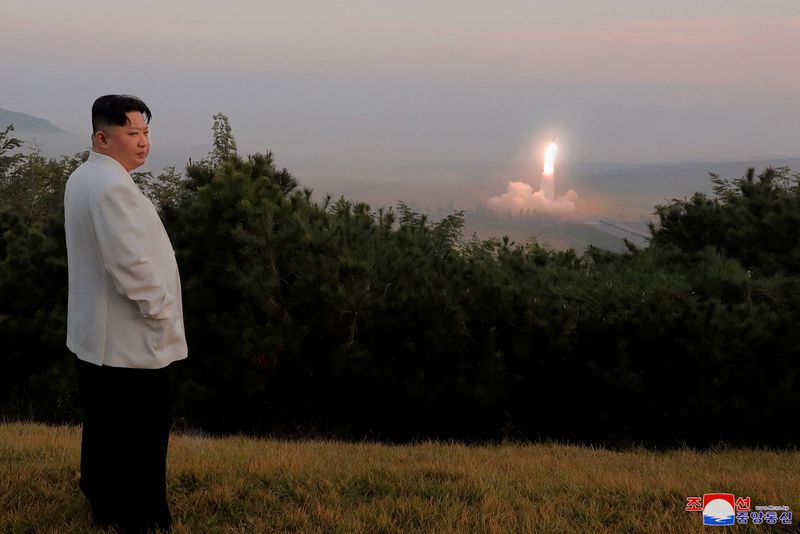By Josh Smith
SEOUL (Reuters) – The prospect of a new North Korean nuclear test underscores the limited options for Washington and its allies, who have embraced “deterring” Pyongyang through major military drills that some current and former officials say may exacerbate tensions.
South Korea said in October that a new nuclear test would face an “unparalleled” response from the allies – but it’s unclear what measures would not retread old ground.
Years of sanctions, diplomatic pressure, and shows of military force have not prevented North Korea from developing and expanding an arsenal of nuclear weapons and long-range ballistic missiles that could reach the United States.
Now that the North’s nuclear weapons are mature and deployed, the United States and its allies are looking to simply dissuade the North from military action.
South Korean Defense Minister Lee Jong-sup said last week the focus of efforts to deal with North Korea should be shifted from curbing nuclear weapons development to deterring their use.
“We plan to expand the scope of our involvement in intelligence sharing, planning, exercises and drills,” he told a panel of lawmakers.
A ministry official told Reuters that Lee was not throwing his support behind the idea of acknowledging North Korea as a nuclear state, but rather was emphasizing the immediate need to prevent North Korea from using the weapons.
“Lee is saying out loud what policy makers in Seoul and Washington are thinking — namely that while denuclearization is the ultimate goal, deterring North Korea is the here-and-now priority,” said Daniel Russel, a former senior U.S. diplomat.
FOCUS ON DETERRENCE
The United States and South Korea are in “lockstep” in their efforts to seek the “complete denuclearization of the Korean Peninsula,” a spokesperson for the U.S. National Security Council said when asked about Lee’s comments.
“We continue to prioritize diplomacy, but simultaneously continue to jointly strengthen deterrence and work to limit the advancement of (North Korea’s) unlawful weapons programmes,” the spokesperson said.
Some analysts saw Lee’s comments as the latest sign that Washington and Seoul are facing the reality that North Korea is a nuclear state. But they noted the focus so far has remained on deterrence rather than risk reduction, such as negotiating to cap the number of North Korean weapons and prevent them from proliferating.
U.S. State Department spokesman Vedant Patel declined to specify what measures Washington would take if North Korea tested a nuclear bomb for the first time since 2017, but cited sanctions and military drills as examples of tools it can use to “hold North Korea accountable.”
Observers expect China and Russia would condemn a new nuclear test, but are unlikely to back new sanctions, which they say have failed and only harm ordinary North Koreans.
The newly released U.S. Nuclear Posture Review says Kim Jong Un’s regime would be annihilated if it ever attacked with nuclear weapons.
‘TURN THE VOLUME DOWN’
In early October, the commander of the U.S. Navy’s 7th Fleet said the rare deployment of an aircraft carrier to South Korea “probably precipitated” part of a “tantrum” from Kim Jong Un.
Another major drill began on Monday with hundreds of South Korean and U.S. warplanes, including a rare deployment of American F-35B fighters.
The drills, a centrepiece of the allied response, have been met with new rounds of missile tests or military exercises by North Korea.
Patel has called suggestions that the drills are exacerbating tensions “baloney.” Duyeon Kim, with the U.S.-based Center for a New American Security, noted that rising tensions are not always correlated with drills.
“Normalizing combined drills strengthens readiness and publicizing them again is intended to deter North Korea and reassure the South Korean people,” Kim said.
One senior former U.S. defence official told Reuters that although the stepped up drills ensure readiness, the publicity and chest-beating surrounding them can be counterproductive.
“They’re doing it because they want to send a message to North Korea, hey, we mean business,” he said. “But it’s not helping.”
When political leaders said drills had been scaled back in previous years to enable diplomacy, that often meant that the exercises were just not being publicized, the former official said, adding that current rhetoric seems to have gone too far in the other direction.
“A way to reduce tension is to sort of turn the volume down a little bit, and see if that helps.”
(Reporting by Josh Smith; Additional reporting by David Brunnstrom in Washington. Editing by Gerry Doyle)
